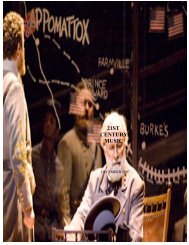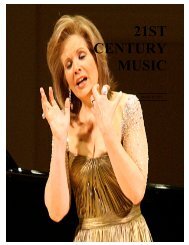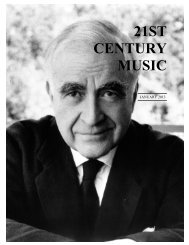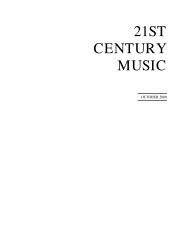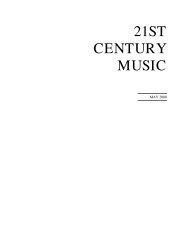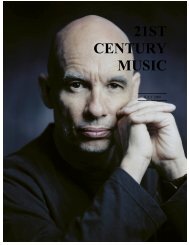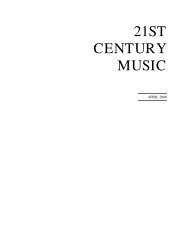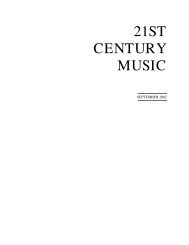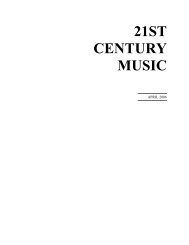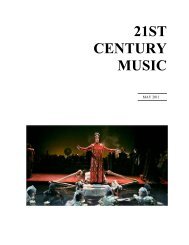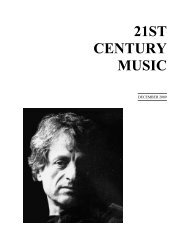You also want an ePaper? Increase the reach of your titles
YUMPU automatically turns print PDFs into web optimized ePapers that Google loves.
The afternoon concert on June 16 did not seem to hold much<br />
promise: one piece only, De Profundis by Roman Berger, a<br />
playback of a recording in the presence of the composer.<br />
Somehow, despite the monumentality of Pawel Sydor's Credo<br />
heard in the evening concert of the same day, Berger's quiet<br />
work, appeared to be the most profoundly "spiritual" of what<br />
was experienced in Kraków. The piece -- scored for bass<br />
voice, piano and cello -- was projected with fascinating, sparse<br />
transformation of sound (reverberation, ring modulation,<br />
echoes) by Edward Kulka. Berger's composition, composed<br />
"because of his internal need" and not in response to any<br />
commissions in 1975 and 1980, uses two somber poems by<br />
Tadeusz Rózewicz, Lament and Ocalony [Saved/Survivor] as<br />
the source of text and ideas. Rózewicz's profound reflections<br />
on the loss of faith and the cruelty of the war find an<br />
appropriately austere setting in Berger's score -- with its<br />
extensive temporal durations and sophisticated use of the<br />
voice and the instruments. After long stretches of darkness --<br />
breathing, wailing voice, at times accompanied by repeated,<br />
pounding chords of the piano -- the brief appearance of cello<br />
cantilena has an almost angelic quality, which is again<br />
overcome by darkness at the end. The poem concludes with its<br />
first line: "I am 24 years old. I survived, while being led to<br />
slaughter." The survivor witnessed unspeakable horrors which<br />
rendered the concepts of human culture meaningless: "these<br />
names are empty and synonymous: / man and animal / love<br />
and hate / enemy and friend / darkness and light." The somber<br />
text and its exquisite musical interpretation by Berger belong<br />
among the most impressive artistic testimonies of the<br />
Holocaust.<br />
Such subtlety and understanding were missing from Sydor's<br />
Credo, a huge, truly "conservative" undertaking (that makes<br />
one miss the "progressiveness" of the greatest 20th-century<br />
composers, such as Messiaen, who remained faithful to their<br />
brands of modernity), but it is too early to severely criticize a<br />
composer born only in 1970, five years before Berger's<br />
composition was conceived. In time, perhaps, this skillful<br />
manipulator of traditional chords will be able to infuse his<br />
creation with some spiritual depth and inspiration -- and this<br />
brings us back to the point of departure, i.e. the spiritual<br />
concept of the festival. Words, even the most exalted ones,<br />
may be meaningless -- perhaps music is at its most spiritual<br />
when it expresses contemplations and reflections of the most<br />
personal kind<br />
The Progressive Rake<br />
ANDREW SHAPIRO<br />
San Francisco Opera presents The Rake's Progress, by Igor<br />
Stravinsky (text by W.H. Auden and Chester Kallman). June<br />
29, War Memorial Opera House, San Francisco, CA.<br />
The San Francisco Opera's presentation of Igor Stravinsky's<br />
The Rake's Progress was adequate for the first two acts and<br />
extraordinary in the third. The impressive stage design by<br />
David Hockney (created for a production in 1975) added an<br />
interesting two dimensionality of enormous and quasi<br />
homogenous muted colored patterns reminiscent of the large<br />
murals of Sol Lewitt; large zones of similar outlined structure<br />
surrounding fabulous atmospheric color schemes.<br />
Raymond Very (tenor), as Tom Rakewell sang effortlessly and<br />
consistently relaxed. Unfortunately, this disappointed because<br />
he didn't seem to have the ability to make one feel anything of<br />
his character's new found wealth and separation from his love<br />
Anne (Rebecca Evans), as a result of his contact with Nick<br />
Shadow (Bryn Terfel), a character representing the devil.<br />
Evans was wonderful. In her aria in the third scene of Act I<br />
she sang entrancingly about missing her love and whether she<br />
should go to London to find Tom. Her voice had the sweet<br />
ability to spring into the upper register of her voice with a<br />
great softness and refinement. Terfel, bass-baritone, proved to<br />
be wonderfully in character throughout; with humorous<br />
mannerisms, he sang strongly as he enacted his plans to lure<br />
Tom to his eventual downfall. The chorus was remarkably<br />
focused and pure, particularly the female voices. At the end of<br />
Act II, Scene II in front of a marvelously lined and colored<br />
backdrop of the facade of Tom's house in London, the<br />
ensemble greets Tom and his new wife, Baba the Turk (Zheng<br />
Cao) with a glowing display of exuberant singing.<br />
Act III began with a stunning stage design (rather resembling<br />
a huge black and white TV) accompanied by the chorus<br />
engaged in an auction in which Tom's possessions are being<br />
sold as a result of his inevitable financial ruin (after all, the<br />
devil is his business advisor). This was a fun ensemble piece<br />
with the occasional splash of color as the auctioneer, Anne and<br />
Baba are all trying to find out how to make the best of the<br />
craziness that seems to have descended into Tom's living<br />
room.<br />
One issue with the performance of the orchestra: The "neo" of<br />
Stravinsky's neo-classicism is strikingly evident in the handful<br />
of occasions when Stravinsky adds an oddly contoured solo<br />
brass line to an orchestral texture of a voice over a light<br />
accompaniment (the orchestra, sans brass, behaving like a<br />
huge lightly strummed guitar) it seemed as though the brass<br />
were too loud and not integrated smoothly enough into the<br />
texture. Barring that, the San Francisco Opera Orchestra, as<br />
would be expected, was precise, balanced and refined under<br />
the baton of conductor Markus Stanz.<br />
Very began to excel as Tom's character became more<br />
developed at the end of Act III, Scene II. Tom and Nick are<br />
engaged in a protracted bargaining session in which Tom<br />
gambles for his life in a game of cards. Over a solo<br />
harpsichord playing a musically demented accompaniment<br />
(the type of material that Andrew Lloyd Webber copies in<br />
Phantom of the Opera), Tom defeats Nick, Nick's last act<br />
before he returns to the underworld is to render Tom insane.<br />
23



